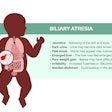
My hospital has recently introduced a new hospital information system. Being an earnest sort, I accepted an invitation to go along to a two-hour briefing session specifically aimed at consultants.
The audience was uncharacteristically lively; both of us asked a number of questions. The system looks very good and will undoubtedly be a huge improvement. I'm not saying our old patient administration system was antiquated, but curators of technology at a nearby science museum have said it is of historical significance, and asked if they could please have it when we've finished with it.
 Dr. Paul McCoubrie is a consultant radiologist at Southmead Hospital in Bristol, U.K.
Dr. Paul McCoubrie is a consultant radiologist at Southmead Hospital in Bristol, U.K.
One aspect of this briefing did stick in the craw a little. It isn't overtly pedantic. Well, OK maybe a little bit. But it rankles; neither spitting bile nor throwing-toys-out-of-the-cot but a jaw-clenching, finger-drumming, 10-mm-Hg-systolic-rise-type issue.
It is over the issue of "ordering" versus "requesting" investigations. Now some people couldn't give two hoots if it is a request or an order. I contend they are quite different words. Similar, yes, but they have very different origins, connotations, and subsequent implications.
A "request" is an entreaty, a polite and formal way of asking for something, a gentlemanly wish, an invitation, possibly involving discussion of the finer aspects. It comes from the Latin "requirere," from re- (expressing intensive force) and quaerere (seek).
"Ordering" is something else entirely. It is a unidirectional demand, a consumerist command, an authoritative diktat. Its etymology is quite different from the Latin "ordinem," meaning "row, series, arrangement, or rank" in secular, honorary, or military orders. Its meaning of command is purely from the notion of "to keep in order."
Many institutions have electronic radiology requesting. To some, paper requests seem quaint and faintly nostalgic. I did hear of a hospital that frequently had to change the computer display screens in fracture clinic. Apparently the orthopods keep scrawling on them and their PACS people can't get all the crayon wiped off.
Well, order communications or "ordercomms" is the accepted technical description of the broader church of electronic requesting. Our dear college has just released a guidance document about how this should work. It is quite technical; I read it thoroughly and even understood some of the words.
I don't think I'm being prissy, but being indirectly ordered to do something gets me rather hot under the collar. Whenever I hear a doctor saying the words "I've just ordered ..." I can't help interrupting with a terse "No, you've just requested ... ."
Junior doctors used to arrive with request card in hand, saying, "Can I discuss a case with you?" Now it is a telephone call saying, "I have ordered this scan, why hasn't it been done yet?" I used to think this change in behavior and language was because most junior doctors learn much of their trade from watching television episodes of "House" and "ER."
Perhaps ordering is quite apt in the American setting. The relationship between clinician and radiologist is different, medical practice is different, and the commercial aspect of medical practice is a factor. However, this model of practice isn't appropriate for the U.K. National Health Service and it isn't necessarily better.
Individual case discussion between radiologist and clinician is at the heart of good medical practice. The more complex and the more sick the patient, the more discussion there should be. The patient gets the right sort of scan, at the right time, and the clinical question is answered. When I say "radiologist," you could substitute any other specialty in there; when I say "scan," you could similarly substitute any opinion, investigation, or therapy.
I am convinced this slide away from requesting to ordering has perniciously warped clinical practice. Not deliberately, mind. I don't doubt that ordercomms can streamline clinical work, but it can inadvertently encourage the crucial discussion step to be skipped. Moreover, avoiding such discussion gets to be seen as an advantage, a positive benefit of the system.
Without having discussions, the clinical question remains ill-defined, the patient often gets the wrong type of scan at the wrong time. The clinical picture is muddied; further investigations are often required to tidy up the mess. It wastes resources, delays management decisions, and is fundamentally bad medicine.
So, when your hospital installs a new system, don't settle for anything less than a system that facilitates "requests" and aids clinical discussion. It isn't raging against the dying of the light, it is fighting corporate hegemony and standing up for good-quality medicine.
Dr. Paul McCoubrie is a consultant radiologist at Southmead Hospital in Bristol, U.K.
The comments and observations expressed herein do not necessarily reflect the opinions of AuntMinnieEurope.com, nor should they be construed as an endorsement or admonishment of any particular vendor, analyst, industry consultant, or consulting group.



















